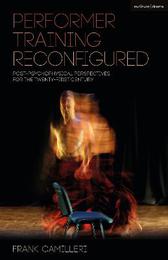
|
Performer Training Reconfigured: Post-Psychophysical Perspectives for the Twenty-First Century
Hardback
Main Details
| Title |
Performer Training Reconfigured: Post-Psychophysical Perspectives for the Twenty-First Century
|
| Authors and Contributors |
By (author) Frank Camilleri
|
| Series | Performance Books |
|---|
| Physical Properties |
| Format:Hardback | | Pages:288 | | Dimensions(mm): Height 216,Width 138 |
|
| Category/Genre | Drama |
|---|
| ISBN/Barcode |
9781350060180
|
| Classifications | Dewey:792.028 |
|---|
| Audience | | Tertiary Education (US: College) | |
|---|
|
Publishing Details |
| Publisher |
Bloomsbury Publishing PLC
|
| Imprint |
Methuen Drama
|
| Publication Date |
24 January 2019 |
| Publication Country |
United Kingdom
|
Description
Offering a radical re-evaluation of current approaches to performer training, this is a text that equips readers with a set of new ways of thinking about and ultimately 'doing' training. Stemming from his extensive practice and incorporating a review of prevailing methods and theories, Frank Camilleri focuses on how material circumstances shape and affect processes of training, devising, rehearsing and performing. Frank Camilleri puts forward the 'post-psychophysical' as a more extended form of psychophysical discussion and practice that emerged and dominated in the 20th century. The 'post-psychophysical' updates the concept of an integrated bodymind in various ways, such as the notion of a performer's bodyworld that incorporates technology and the material world. Offering invaluable introductions to a wide range of theories around which the book is structured - including postphenomenological, sociomaterial, affect and situated cognition - this volume provides readers with an enticing array of critical approaches to training and creative processes.
Author Biography
Frank Camilleri is Associate Professor in Theatre Studies at the University of Malta where he is also Director of the School of Performing Arts' research centre for 21st Century Studies in Performance. He is Artistic Director and founder of Icarus Performance Project, which serves as the main platform of his Practice as Research (www.icarusproject.info).
ReviewsCamilleri boldly argues that we should move on from the psychophysical paradigm which has dominated acting theories for the last decade or more. With the term post-psychophysical, his innovative approach encompasses the much broader social and technological context in which today's performer operates, opening up new horizons for acting practices and theories. Performer Training Reconfigured is not only an important book for researchers of performance and philosophy but also one that will be useful for practitioners who will be inspired by Camilleri's perspectives and suggestions. * Paul Allain, University of Kent, UK * An excellent study of performance training that goes beyond the limits of psychophysical approaches to performance, and that introduces current thoughts about science, art and the phenomenological experience. * John Lutterbie, Stony Brook University, USA * Density, diversity and accuracy characterize this book. It recreates a panorama that makes visible the extraordinary adventure of training, highlighting a lateral apprenticeship to the traditional preparation for acting. The book made me reflect on the material conditions in which training takes place, including as it relates to my practice, on the links between ways of thinking and acting. * Eugenio Barba, Odin Teatret, Denmark * It is an impressive and potentially paradigm shifting account, arising from the various turns to affect and cognition, encompassing and integrating perspectives from phenomenology, new materialism posthumanism, technoscience, suggest an alternative approaches to performance studies and practical processes. It documents how material circumstances shape and affect processes of training and performance making. In some respects it is a manifesto for the 21st century, challenging mind/body dualisms through a relational and ecological approach, conceptualized as "post psycho-physical". It invites controversy but the quality of scholarship is one of its strengths. * Professor Nicola Shaughnessy, University of Kent, UK * Performer Training Reconfigured is the culminating product of three decades of applied studio research... It is a work that navigates between analysis and practice in a re-examination of performer training and body-centered dramaturgy viewed through the lens of the post-postmodern. This is a 'must read' work for scholars and practitioners alike who are interested in theatre training and embodied practice in an age of what Camilleri identifies as post-psychophysical, that is, an epistemic universe in which technology and the material world are as important to training and expression as the corporeal self. * Ian Watson, Rutgers University-Newark, USA * Frank Camilleri has opened up the ways to think about performer training in scholarship and in practice. Looking beyond the mind-body binary to the post-psychophysical, he situates performing practices within a broader spectrum of socio-materialist, technological and cognitive paradigms and pulls the discourse of performer training into the new millennium. With detail and rigour Camilleri harnesses an impressive range of theoretical constructs to sharpen the tools of analysis and to re-conceptualise the agency of the performer. His concept of bodyworld is a game changer. * Lisa Peck, University of Sussex, UK * In this stimulating volume, Frank Camilleri draws on his experience as a theatre practitioner-scholar to carefully tease out those aspects of performer training that are often left in the background during discussions of psychophysical performance practices. This marginalisation is performed even by those whose practices might already be post-psychophysical in Camilleri's terms. Drawing on a combination of theoretical approaches including agential realism, assemblage theory and postphenomenology, Camilleri practises a critical posthumanist reconfiguration of performer training that respectfully builds on and supplements the insights of the dominant psychophysical performance paradigm. * Franc Chamberlain, University of Huddersfield, UK *
|